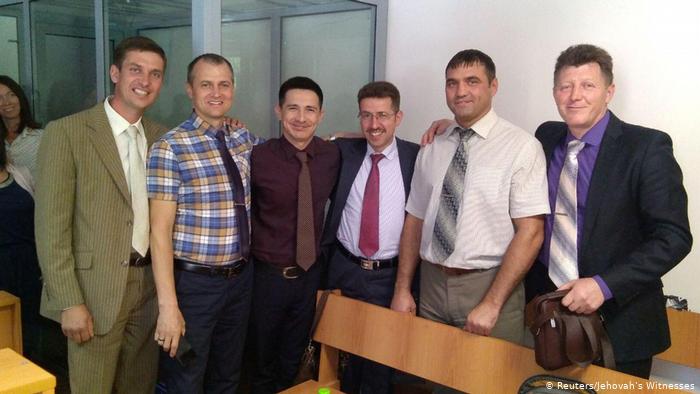By James Simons
Jehovah’s Witness alleged extremity is being examined after six Jehovas witnesses were sentenced to six years in prison by a Russian court for extremist activity. The Russian authorities have outlawed the U.S-based Christian sect
Vladimir Alushkin, 55, was sentenced in Penza, about 350 miles (563 km) southeast of Moscow, alongside five others who were given lesser jail terms. This publication has been examining the integrity of the religious sect after receiving complaints in the last two months about extreme practices that actively causes depression among very young people. The Eye Of Media.Com has heard that Jehovas Witnesses influence their flock to distant even family members who depart from the faith or live against the principles of the bible. Known as de-fellowshipping , known members of the faith who have been baptised are shunned and cut off by their family members and friends, if caught to be dishonouring the faith. Jehovah’s Witnesses are known for their door-to-door preaching, and reject blood transfusions and do not celebrate birthdays.
Photos of six strong adherents of the faith were handed out by the Jehovas Witness Organisation in Russia[pictured] , as the practices of the generally humbled Christian sect undergoes close scrutiny by researchers and lawyers seeking to establish whether the entire global organisation can be found to be breaking known laws like undermining the right to family life guaranteed by the human Rights Act
EXTREMITY
A female researcher rejected from her Jehovas Witness family raised the issue of extremity in the Jehovas Witness doctrine with this publication, sparking discussions with the sect with the aim of a broader independent investigation of their practice Defenders of the belief say it is right that they remove ‘the wicked one’ from their midst. Those discussions and inquiries were further escalated after the verdict in the Russian Court, despite the bad track record of Russia’s Human Rights past.
Russian authorities have been criticised for being unduly harsh on, but both the government and the Russian Orthodox Church says that the Jehovah’s Witnesses constitutes a threat to the country’s institutions. Russia’s Supreme Court also ordered the closure of the Christian group’s headquarters in Russia and its 395 local chapters. The ruling also said the organisation must hand over all its property to the state, Russian news agencies reported.
“They pose a threat to the rights of citizens, public order and public security,” Interfax news agency quoted justice ministry attorney Svetlana Borisova as saying. Sergei Cherepanov, a Jehovah’s Witnesses representative, said the group plans to appeal the decision in the European Court of Human Rights.
“We will do everything possible,” Interfax quoted Cherepanov as saying. He added that he was worried that members of the group could face jail time if they continued to gather. Several of Jehovas witnesses publications were placed on a list of banned extremist literature . Prosecutors have described it as an organisation that destroys families and threatens lives.
The powerful Russian Orthodox Church has spoken out against the group with one official calling it a “destructive sect” last month. Human Rights Watch criticised the court’s decision as an impediment to religious freedom in Russia.
“The Supreme Court’s ruling to shut down the Jehovah’s Witnesses in Russia is a terrible blow to freedom of religion and association in Russia,” Rachel Denber, deputy Europe and Central Asia director at Human Rights Watch, said.




